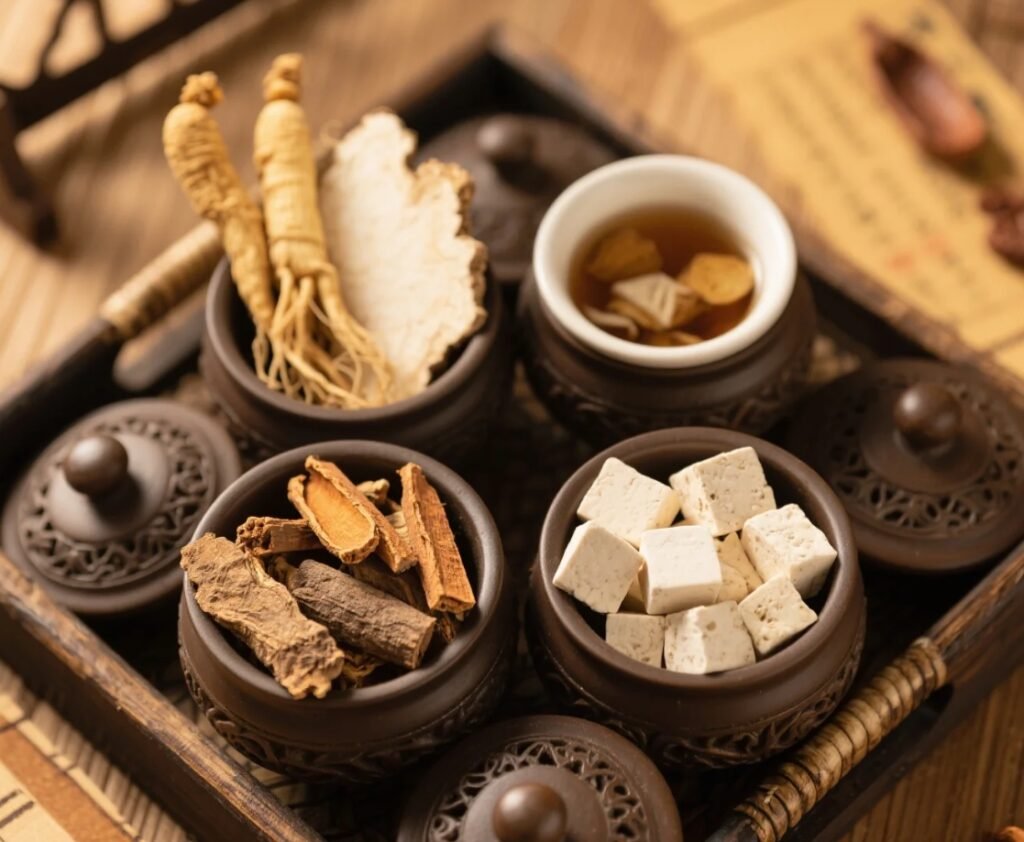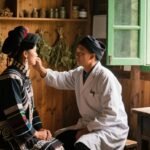Si Jun Zi Tang (Four Gentlemen Decoction)
Basic Profile
Chinese Name: 四君子汤
Function: Tonifies qi and strengthens the spleen
Indications: Spleen and stomach qi deficiency
Category: Qi-Tonifying Formula
Source: Tai Ping Hui Min He Ji Ju Fang (Song Dynasty)
Honorary Title: Regarded as the most classic qi-tonifying prescription in TCM
Composition
Ginseng Root (renshen) – 9g
Atractylodes Rhizome (baizhu) – 9g
Poria (fuling) – 9g
Honey-Fried Licorice Root (zhigancao) – 6g
Note: Dosages should be adjusted based on body constitution and condition. Use under professional guidance.
Clinical Symptoms & Indications
Pale or sallow complexion
Fatigue, low energy
Weak voice, shortness of breath
Poor appetite, bloating after meals
Loose stool
Pale tongue with white coating, weak pulse
Modern Applications:
Chronic gastritis
Indigestion
Post-illness weakness
Functional anemia (TCM-defined)
Formula Explanation
Ginseng (renshen): Warm and sweet; tonifies spleen qi and supports digestion
Atractylodes (baizhu): Bitter and warm; strengthens the spleen and dries dampness
Poria (fuling): Sweet and bland; aids spleen, eliminates dampness
Licorice (zhigancao): Sweet and warm; harmonizes the formula and supports middle qi
“All four herbs are sweet and warm, tonifying and balanced — just like the virtuous qualities of a gentleman. Hence the name: Four Gentlemen Decoction.”
Decoction Method
Soak herbs for 30 minutes
Boil with high heat until boiling, then simmer for 30 minutes
Strain the decoction and repeat once
Mix both batches, divide into two portions, and take warm in the morning and evening

Cautions
Not suitable for individuals with damp-heat or excess heat syndromes (e.g., yellow greasy tongue, fever, constipation)
Pregnant women, children, or individuals with special conditions should consult a TCM physician
Avoid raw, cold, or greasy food during the (used in traditional contexts) period
Classical Modifications
Yi Gong San: + Tangerine Peel (chenpi) – for qi deficiency with mild stagnation
Liu Jun Zi Tang: + chenpi and Pinellia (banxia) – for phlegm-damp retention
Xiang Sha Liu Jun Zi Tang: + muxiang and sharen – for qi deficiency with bloating and belching
Classical References
Tai Ping Hui Min He Ji Ju Fang (Song Dynasty)
First official record: “Si Jun Zi Tang is used to treat qi deficiency of the protective and nutritive layers, weak zang-fu, abdominal distention, poor appetite, diarrhea, vomiting.”
Dosage: Equal parts renshen, baizhu, fuling, zhigancao; taken as powder or decoction.
Jing Yue Quan Shu (Ming Dynasty, Zhang Jingyue)
Declared this formula as “the principal recipe for qi tonification”
Yi Xue Ru Men (Ming Dynasty, Li Chan)
Mnemonic verse:
“Si Jun Zi Tang means harmony,
Ren-Shen, Bai-Zhu, Fu-Ling, Gan-Cao in unity…”
Yi Zong Jin Jian (Qing Dynasty, Wu Qian)
Discussed clinical indications in detail, especially for weak digestion and pale complexion
Yi Fang Kao (Ming Dynasty, Wu Kun)
In-depth analysis: “The pale face, soft voice, weak limbs — all suggest qi deficiency. Si Jun Zi Tang balances and fortifies, like a true gentleman.”
Other mentions:
Lan Shi Mi Cang (Jin Dynasty, Li Dongyuan): Though not directly named, its principles deeply influenced later qi-tonic formulas
Gu Jin Ming Yi Fang Lun (Qing Dynasty): Compiled extensive commentary on this formula by generations of physicians
Modern Scientific Research
1. Anti-aging Effects
Title: Elucidating the anti-aging mechanism of Si Jun Zi Tang by integrating network pharmacology and experimental validation in vivo
Journal: Aging (Albany NY), 2022
Findings: Si Jun Zi Tang acts on PI3K-AKT and P38 MAPK signaling pathways; key compounds like quercetin and kaempferol interact with core targets AKT1, STAT3, TP53
Read Article
2. Immunity & Gut Microbiota
Title: Immuno-adjuvant activity of water-soluble polysaccharides from Si Jun Zi Tang and single herbs
Journal: Chinese Journal of Public Health, 2021
Summary: Medium molecular polysaccharides from the formula promoted macrophage activity and upregulated CD40, CD86, TLR4
View Article
3. Chronic Atrophic Gastritis
Title: Meta-analysis of modified Sijunzi decoction for the (used in traditional contexts) of chronic atrophic gastritis
Journal: Medicine, 2024
Findings: The modified formula improved symptoms, Helicobacter pylori eradication, and gastric mucosa pathology better than Western treatments
View Article
4. Liver & Gastric Cancer Dual Mechanism
Title: Mechanism of “treating different diseases with the same formula” in primary liver and gastric cancer based on network pharmacology
Journal: Traditional Chinese Medicine, 2023
Findings: Shared targets like AKT1, TP53, VEGFA confirmed multitarget regulatory role
PDF
5. Chemotherapy Support for Lung Cancer
Title: Si Jun Zi decoction inhibits the growth of lung cancer by reducing myelosuppression and improving survival in mice
Journal: Journal of Ethnopharmacology, 2023
Summary: Reduced chemo-induced myelosuppression, extended survival in animal studies
Read More


Leave a Reply